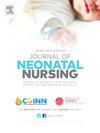Mothers` experience with transitions in the process towards neonatal digital homecare
Q2 Nursing
引用次数: 0
Abstract
Objective
This study aimed to explore mothers` experiences with transitions from the neonatal intensive care unit (NICU) to digital homecare.
Methods
Semi-structured, in-depth interviews were conducted with five mothers whose preterm infants had received digital homecare from a NICU in Norway. All interviews were conducted through video call due to COVID-19 safety restrictions. Interview transcripts were analysed using Tjora's stepwise deductive inductive method. Meleis' Transition Theory provides the theoretical framework for this analysis.
Results
The study identifies two critical transitions. The informants experienced specific conditions that affected the transitions, resulting in varying perceptions of whether the transitions towards digital homecare were good and, subsequently, whether the transitions were health-promoting, such as coping with the parental role. Three themes emerged: (1) the need for ongoing information, (2) relational continuity, and (3) defined roles.
Conclusions
Mothers in the NICU undergo a complex and multifaceted transition as they assume the responsibilities of independent caregivers while simultaneously managing the various situational shifts within the unit and the progression toward early discharge. Given the challenges inherent in this process, healthcare professionals must prioritize comprehensive support throughout each phase, ensuring an optimal and well-coordinated transition.
母亲在新生儿数字家庭护理过程中的过渡经验
目的本研究旨在探讨母亲从新生儿重症监护病房(NICU)过渡到数字家庭护理的经验。方法采用半结构化、深度访谈的方法,对挪威一家新生儿重症监护室中接受数字家庭护理的5名早产儿母亲进行访谈。由于新冠肺炎安全限制,所有采访均通过视频电话进行。访谈记录采用Tjora逐步演绎归纳法进行分析。Meleis的过渡理论为这一分析提供了理论框架。结果研究确定了两个关键的转变。被调查者经历了影响转变的特定条件,导致他们对向数字家庭护理的转变是否良好以及随后对转变是否促进健康(如应对父母角色)的看法不一。出现了三个主题:(1)对持续信息的需求;(2)关系连续性;(3)定义的角色。结论新生儿重症监护室的母亲经历了一个复杂而多方面的转变,因为她们承担了独立照顾者的责任,同时还要处理病房内的各种情况变化,并朝着早期出院的方向发展。鉴于这一过程中固有的挑战,医疗保健专业人员必须在每个阶段优先考虑全面的支持,确保最佳和协调良好的过渡。
本文章由计算机程序翻译,如有差异,请以英文原文为准。
求助全文
约1分钟内获得全文
求助全文
来源期刊

Journal of Neonatal Nursing
Nursing-Pediatrics
CiteScore
2.00
自引率
0.00%
发文量
143
期刊介绍:
Aims & Scope: This is the practical, bimonthly, research-based journal for all professionals concerned with the care of neonates and their families, both in hospital and the community. It aims to support the development of the essential practice, management, education and health promotion skills required by these professionals. The JNN will provide a forum for the exchange of ideas and information between the range of professionals working in this field; promote cooperation between these professionals; facilitate partnership care with families; provide information and informed opinion; promote innovation and change in the care of neonates and their families; and provide an education resource for this important rapidly developing field.
 求助内容:
求助内容: 应助结果提醒方式:
应助结果提醒方式:


